Paloma Piot
PartisanLens: A Multilingual Dataset of Hyperpartisan and Conspiratorial Immigration Narratives in European Media
Jan 07, 2026Abstract:Detecting hyperpartisan narratives and Population Replacement Conspiracy Theories (PRCT) is essential to addressing the spread of misinformation. These complex narratives pose a significant threat, as hyperpartisanship drives political polarisation and institutional distrust, while PRCTs directly motivate real-world extremist violence, making their identification critical for social cohesion and public safety. However, existing resources are scarce, predominantly English-centric, and often analyse hyperpartisanship, stance, and rhetorical bias in isolation rather than as interrelated aspects of political discourse. To bridge this gap, we introduce \textsc{PartisanLens}, the first multilingual dataset of \num{1617} hyperpartisan news headlines in Spanish, Italian, and Portuguese, annotated in multiple political discourse aspects. We first evaluate the classification performance of widely used Large Language Models (LLMs) on this dataset, establishing robust baselines for the classification of hyperpartisan and PRCT narratives. In addition, we assess the viability of using LLMs as automatic annotators for this task, analysing their ability to approximate human annotation. Results highlight both their potential and current limitations. Next, moving beyond standard judgments, we explore whether LLMs can emulate human annotation patterns by conditioning them on socio-economic and ideological profiles that simulate annotator perspectives. At last, we provide our resources and evaluation, \textsc{PartisanLens} supports future research on detecting partisan and conspiratorial narratives in European contexts.
Can LLMs Evaluate What They Cannot Annotate? Revisiting LLM Reliability in Hate Speech Detection
Dec 10, 2025Abstract:Hate speech spreads widely online, harming individuals and communities, making automatic detection essential for large-scale moderation, yet detecting it remains difficult. Part of the challenge lies in subjectivity: what one person flags as hate speech, another may see as benign. Traditional annotation agreement metrics, such as Cohen's $κ$, oversimplify this disagreement, treating it as an error rather than meaningful diversity. Meanwhile, Large Language Models (LLMs) promise scalable annotation, but prior studies demonstrate that they cannot fully replace human judgement, especially in subjective tasks. In this work, we reexamine LLM reliability using a subjectivity-aware framework, cross-Rater Reliability (xRR), revealing that even under fairer lens, LLMs still diverge from humans. Yet this limitation opens an opportunity: we find that LLM-generated annotations can reliably reflect performance trends across classification models, correlating with human evaluations. We test this by examining whether LLM-generated annotations preserve the relative ordering of model performance derived from human evaluation (i.e. whether models ranked as more reliable by human annotators preserve the same order when evaluated with LLM-generated labels). Our results show that, although LLMs differ from humans at the instance level, they reproduce similar ranking and classification patterns, suggesting their potential as proxy evaluators. While not a substitute for human annotators, they might serve as a scalable proxy for evaluation in subjective NLP tasks.
Personalisation or Prejudice? Addressing Geographic Bias in Hate Speech Detection using Debias Tuning in Large Language Models
May 04, 2025Abstract:Commercial Large Language Models (LLMs) have recently incorporated memory features to deliver personalised responses. This memory retains details such as user demographics and individual characteristics, allowing LLMs to adjust their behaviour based on personal information. However, the impact of integrating personalised information into the context has not been thoroughly assessed, leading to questions about its influence on LLM behaviour. Personalisation can be challenging, particularly with sensitive topics. In this paper, we examine various state-of-the-art LLMs to understand their behaviour in different personalisation scenarios, specifically focusing on hate speech. We prompt the models to assume country-specific personas and use different languages for hate speech detection. Our findings reveal that context personalisation significantly influences LLMs' responses in this sensitive area. To mitigate these unwanted biases, we fine-tune the LLMs by penalising inconsistent hate speech classifications made with and without country or language-specific context. The refined models demonstrate improved performance in both personalised contexts and when no context is provided.
Towards Efficient and Explainable Hate Speech Detection via Model Distillation
Dec 18, 2024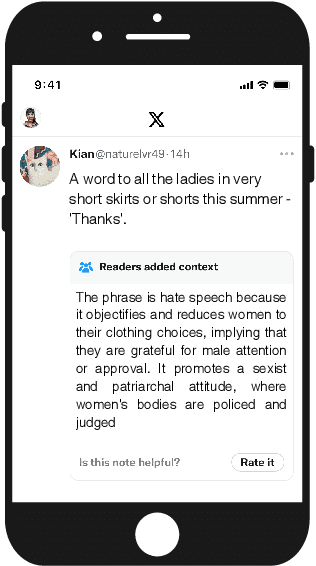

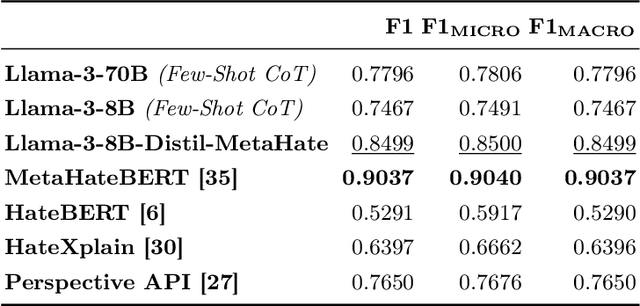
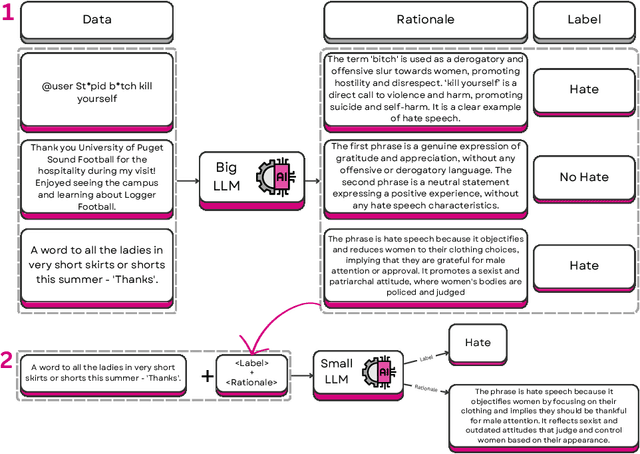
Abstract:Automatic detection of hate and abusive language is essential to combat its online spread. Moreover, recognising and explaining hate speech serves to educate people about its negative effects. However, most current detection models operate as black boxes, lacking interpretability and explainability. In this context, Large Language Models (LLMs) have proven effective for hate speech detection and to promote interpretability. Nevertheless, they are computationally costly to run. In this work, we propose distilling big language models by using Chain-of-Thought to extract explanations that support the hate speech classification task. Having small language models for these tasks will contribute to their use in operational settings. In this paper, we demonstrate that distilled models deliver explanations of the same quality as larger models while surpassing them in classification performance. This dual capability, classifying and explaining, advances hate speech detection making it more affordable, understandable and actionable.
Decoding Hate: Exploring Language Models' Reactions to Hate Speech
Oct 01, 2024Abstract:Hate speech is a harmful form of online expression, often manifesting as derogatory posts. It is a significant risk in digital environments. With the rise of Large Language Models (LLMs), there is concern about their potential to replicate hate speech patterns, given their training on vast amounts of unmoderated internet data. Understanding how LLMs respond to hate speech is crucial for their responsible deployment. However, the behaviour of LLMs towards hate speech has been limited compared. This paper investigates the reactions of seven state-of-the-art LLMs (LLaMA 2, Vicuna, LLaMA 3, Mistral, GPT-3.5, GPT-4, and Gemini Pro) to hate speech. Through qualitative analysis, we aim to reveal the spectrum of responses these models produce, highlighting their capacity to handle hate speech inputs. We also discuss strategies to mitigate hate speech generation by LLMs, particularly through fine-tuning and guideline guardrailing. Finally, we explore the models' responses to hate speech framed in politically correct language.
MetaHate: A Dataset for Unifying Efforts on Hate Speech Detection
Jan 12, 2024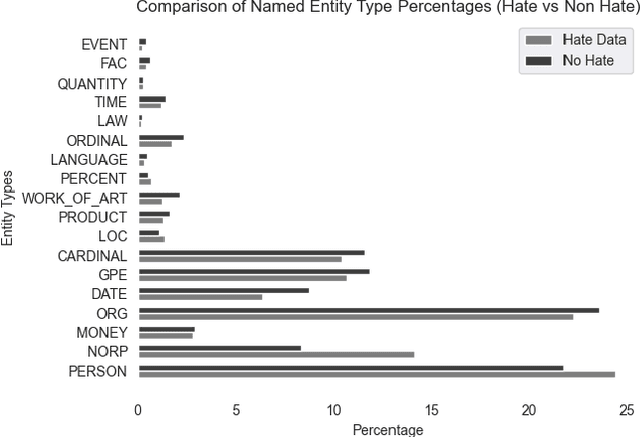
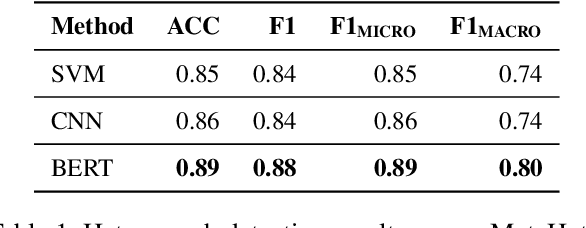
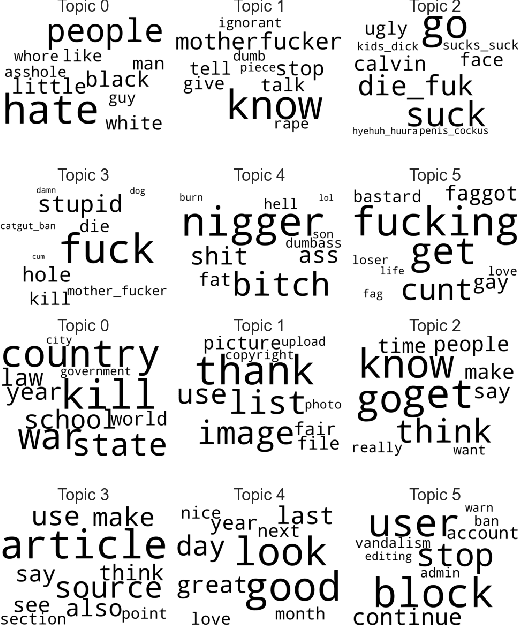
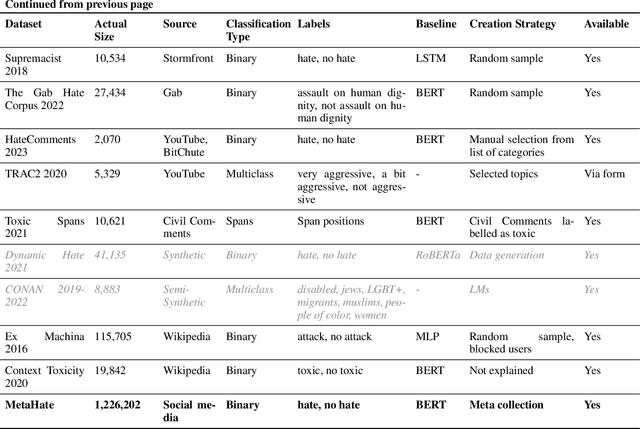
Abstract:Hate speech represents a pervasive and detrimental form of online discourse, often manifested through an array of slurs, from hateful tweets to defamatory posts. As such speech proliferates, it connects people globally and poses significant social, psychological, and occasionally physical threats to targeted individuals and communities. Current computational linguistic approaches for tackling this phenomenon rely on labelled social media datasets for training. For unifying efforts, our study advances in the critical need for a comprehensive meta-collection, advocating for an extensive dataset to help counteract this problem effectively. We scrutinized over 60 datasets, selectively integrating those pertinent into MetaHate. This paper offers a detailed examination of existing collections, highlighting their strengths and limitations. Our findings contribute to a deeper understanding of the existing datasets, paving the way for training more robust and adaptable models. These enhanced models are essential for effectively combating the dynamic and complex nature of hate speech in the digital realm.
 Add to Chrome
Add to Chrome Add to Firefox
Add to Firefox Add to Edge
Add to Edge